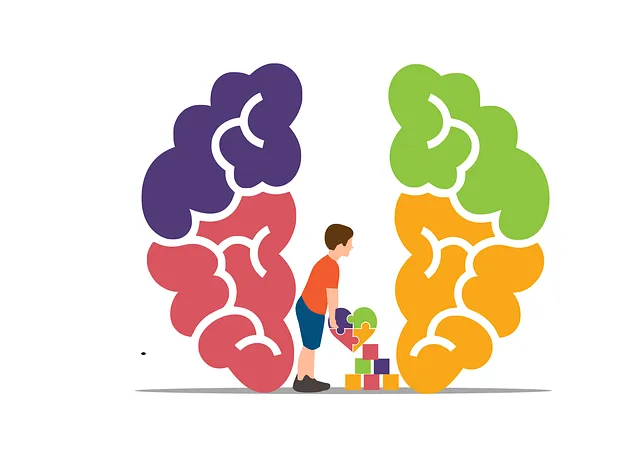In today's fast-paced world, mental wellness is crucial, leading to increased demand for self-assessment tools. Kaiser Permanente's behavioral health providers in Littleton are at the forefront of Mental Health Awareness, offering accessible resources like self-reflection and evaluation for early detection. Their comprehensive assessments streamline risk management, improve decision-making, and enhance support for both healthcare providers and patients. By combining practices like Social Skills Training and mental wellness journaling, they've improved outcomes. An ideal self-assessment tool should cover diverse psychological aspects, include mood, anxiety, sleep, and social interactions, promote emotional awareness, integrate mindfulness, and offer personalized recommendations based on cultural contexts. The creation process involves extensive research, design, validation, and user feedback to ensure a culturally sensitive, evidence-based assessment that empowers individuals for personalized care from Kaiser Permanente behavioral health providers in Littleton. Success is measured through progress tracking, data analysis, and continuous refinement, fostering a dynamic environment of learning and growth.
Mental wellness self-assessment tools play a crucial role in fostering individual awareness and promoting proactive healthcare. As demonstrated by Kaiser Permanente behavioral health providers in Littleton, these tools empower individuals to take charge of their mental well-being. This article explores the development process, key components, and continuous improvement strategies for effective mental wellness self-assessments. By understanding the need and leveraging successful case studies, we can enhance access to mental healthcare resources, particularly through innovative solutions inspired by industry leaders like Kaiser Permanente.
- Understanding the Need for Mental Wellness Self-Assessment Tools
- Kaiser Permanente Behavioral Health Providers in Littleton: A Case Study
- Key Components of an Effective Mental Wellness Self-Assessment
- Development Process: From Research to Implementation
- Measuring Success and Continuous Improvement Strategies
Understanding the Need for Mental Wellness Self-Assessment Tools

In today’s fast-paced world, mental wellness is a critical aspect of overall health, and recognizing this need has led to an increased demand for effective self-assessment tools. Organizations like Kaiser Permanente behavioral health providers in Littleton are at the forefront of this initiative, emphasizing the importance of Mental Health Awareness and well-being among their clients and staff. These self-assessment tools play a pivotal role in empowering individuals to take charge of their mental health proactively. By providing an accessible means for self-reflection and evaluation, they facilitate early detection of potential issues, enabling timely intervention and support.
The development of such tools is particularly relevant for mental health professionals who often juggle heavy caseloads and diverse patient populations. Implementing Risk Management Planning for Mental Health Professionals can be streamlined with comprehensive self-assessment resources, fostering a culture of care and Confidence Boosting within the industry. Ultimately, these assessments contribute to better-informed decision-making, improved treatment planning, and enhanced support systems for both healthcare providers and their patients.
Kaiser Permanente Behavioral Health Providers in Littleton: A Case Study

Kaiser Permanente Behavioral Health Providers in Littleton serves as a compelling case study for mental wellness self-assessment tool development. By integrating innovative practices into their community outreach program, they’ve demonstrated how tailored interventions can significantly enhance mental health outcomes. For instance, their Social Skills Training has shown promise in empowering individuals to manage stress and anxiety through peer support networks.
Furthermore, the organization has encouraged mental wellness journaling exercises guided by professionals, fostering self-reflection and personal growth. These initiatives highlight the importance of accessible, community-based programs that cater to diverse needs. The success of Kaiser Permanente’s approach underscores the potential for developing comprehensive self-assessment tools that not only identify mental health concerns but also offer practical strategies for improvement, reflecting a holistic and effective approach to mental wellness.
Key Components of an Effective Mental Wellness Self-Assessment

An effective mental wellness self-assessment tool should incorporate several key components to ensure accurate and insightful evaluation. Firstly, it must include a comprehensive range of questions that touch upon various aspects of an individual’s mental health, such as mood, anxiety levels, sleep quality, and social interactions. These questions should be designed to capture both the present state and any discernible patterns over time. Incorporating prompts related to daily experiences and thoughts can help users reflect on their emotional responses in different scenarios, providing a nuanced understanding of their mental wellness.
Additionally, integrating evidence-based practices like mindfulness meditation and stress management techniques within the assessment is beneficial. For instance, including short self-reflection exercises or simple breathing exercises can not only enhance user engagement but also offer immediate coping strategies. The tool should also consider personalizing recommendations by factoring in individual preferences and cultural contexts, ensuring relevance and practicality. Moreover, promoting access to resources like Mental Wellness Coaching Programs Development and Stress Management Workshops Organization can empower users to take proactive steps towards improving their mental health, as advocated by Kaiser Permanente behavioral health providers Littleton.
Development Process: From Research to Implementation

The development process of a comprehensive mental wellness self-assessment tool involves several stages, meticulously designed to cater to the unique needs of individuals seeking emotional support. It begins with an extensive research phase where experts from Kaiser Permanente behavioral health providers in Littleton delve into existing literature and study various psychological assessments to identify gaps and opportunities for innovation. This includes exploring emerging trends like Emotional Intelligence as a predictor of mental wellness and understanding burnout prevention strategies effective in today’s fast-paced world.
Through this research, the team identifies key areas for assessment, incorporating elements that support emotional healing processes. They collaboratively design and validate the tool, ensuring cultural sensitivity and adaptability to diverse populations. The result is a user-friendly, evidence-based assessment designed to empower individuals while providing valuable insights for Kaiser Permanente behavioral health providers in Littleton to offer personalized care and guidance.
Measuring Success and Continuous Improvement Strategies

Measuring success is a vital aspect of developing effective self-assessment tools for mental wellness. The journey to optimal well-being involves numerous factors and personal milestones, making it essential to have a comprehensive evaluation system. At Kaiser Permanente behavioral health providers in Littleton, we recognize that each individual’s path to mental health awareness is unique. Therefore, our success metrics should reflect this diversity, focusing on progress rather than perfection. By setting achievable goals and tracking improvements over time, we can accurately assess the tool’s impact. This data-driven approach enables us to adapt and refine the self-assessment process continuously, ensuring it remains relevant and beneficial for all users.
To foster continuous improvement, regular feedback from users is invaluable. Encouraging open dialogue about their experiences allows us to identify areas of strength and weakness in the tools. Integrating this user-centric perspective into our development strategy ensures that the mental wellness podcast series production aligns with the evolving needs of individuals seeking support. By embracing Mind Over Matter principles, we can create a dynamic environment where learning and growth thrive, ultimately enhancing the overall Mental Health Awareness journey.
The development of mental wellness self-assessment tools, as demonstrated by the case study of Kaiser Permanente behavioral health providers in Littleton, is a proactive step towards addressing growing mental health concerns. By incorporating key components such as accessibility, validity, and user-friendliness, these tools can empower individuals to take charge of their mental well-being. Continuous improvement strategies, grounded in measurable success, ensure that these assessments remain relevant and effective in today’s evolving landscape of behavioral health care. This approach not only benefits Kaiser Permanente’s clients but also sets a benchmark for other organizations aiming to enhance their mental wellness support systems.






